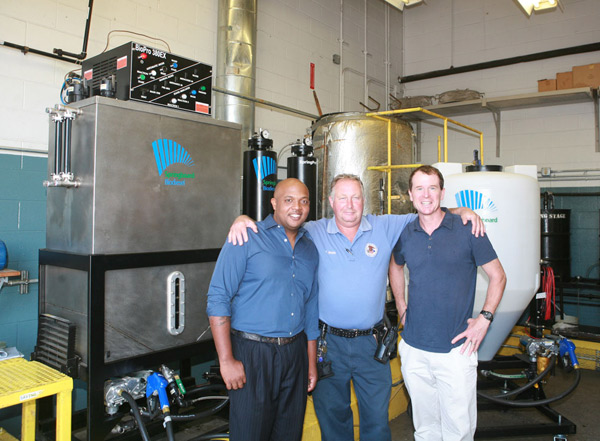 I just returned from a federal prison in Maryland.
I just returned from a federal prison in Maryland.
I was “in” for 4 days training inmates on how to make biodiesel in an appliance we make called The BioPro™.
It turns out that there are 116 Federal prisons in the United States and, by law, all of the estimated 210,000 inmates therein interned must be sustained and kept alive with food. As is the case with all dining facilities, a prison will always generate used cooking oil in the process of feeding their inmates. That used cooking oil, fats and all, can be poured into our automated BioPros™ and, with the press of a button, converted easily into premium grade biodiesel fuel.
‘So what,’ you say?
This is the “what”: A prison can do this for 90 cents per gallon! Such is the cost of all of the inputs and electricity required to make the biodiesel in a BioPro™. Considering that biodiesel is a fuel that will run in any diesel engine, neat (B-100) or mixed with diesel, without any need to convert the engine, and further noting that biodiesel burns approximately 80 to 90% cleaner than regular diesel, you have a rather emphatic win here. The recycling of tax dollars into domestically made renewable fuel at a fraction of the cost of petroleum diesel, in a machine made in the USA. (…want ice cream with that pie?)
The Prison in Maryland was extremely clean. There was a high-security section where the meaner felons were kept and there was a low-security section where the white collar criminals with more manageable sentences were held. The latter, called “the camp”, was where the garage and the biodiesel production was located. The Camp didn’t have an outer wall to keep inmates in.
“What stops them from fleeing”? I asked the garage foreman affectionately referred to as “Smitty” by the inmates.
“They know it’s not worth it,” said Smitty. “We’d eventually find them and their sentences are too short to bother.” Better to wait it out.
The five guys who were assigned to making biodiesel were there because they were truly interested and wanted to learn.
“These guys have nothing but time.”
I asked Smitty what these guys were in for. He shrugged and said, “Drugs.” Anything else, I asked? Long pause. “No, just drugs,” he said. Later, when we were weighing out chemicals, I noticed that these guys could load up 3060 grams of Sodium Hydroxide with alarming alacrity.
There is nothing like free labor. (Actually inmates were paid 40 cents per hour).
Smitty and his assistants had made biodiesel before, in a machine made in Costa Rica, and when they discovered how easy it was to use the BioPro™, they were visibly excited.
The machines, since they are automated, reduce labor tremendously but they still need to be loaded and unloaded and inputs need to be managed. When they weren’t working with the equipment, the inmates could make soap from the glycerin byproduct, or they could sit around on old office chairs watching and talking. On the final day, to make sure they’d been paying attention, I gave them a quiz. They all knew the answers. They’d paid attention and actually wanted to know. One inmate, a guy we referred to as “Morpheus” (as in “The Matrix”), told us he’d be out in a month and asked if there was work in biodiesel. I told him the industry was young, misunderstood, but growing none the less.
Holding up a beaker of finished biodiesel that had come out of the equipment 9 hours after they’d started a batch, Smitty the foreman cut in, “this is freakin’ beautiful fuel.”
-Matt Roberts
SB

